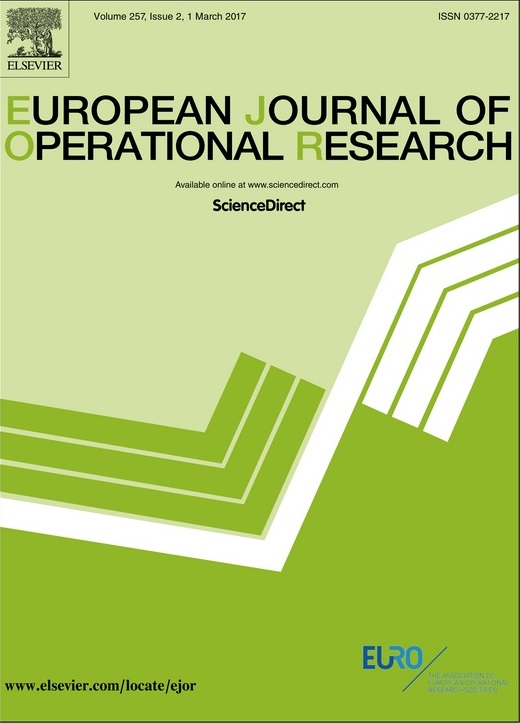EURO Journal on Computational Optimization (EJCO)
Special Issue on Modern Optimization Approaches to Classification
The special issue aims to promote research on theoretical and practical aspects of classification and clustering, combined with modern optimization techniques. In particular, the focus is on algorithms and models, introducing an innovative application of optimization tools to classification problems.
Guest editors:
- Prof. Laura Palagi, Department of Computer, Control, and Management Engineering Antonio Ruberti, Sapienza University of Rome. Email: laura.palagi@uniroma1.it
- Prof. Veronica Piccialli, Department of Computer, Control, and Management Engineering Antonio Ruberti, Sapienza University of Rome. Email: veronica.piccialli@uniroma1.it
- Prof. António Pedro Duarte Silva, Católica Porto Business School, Univ. Católica Portuguesa. Email: psilva@ucp.pt
Special issue information:
The last few years have witnessed an increasing interaction between the Optimization and Data Science communities, leading to innovative results in both fields. The special issue is intended to be a collection of original research papers reflecting the intersection of optimization and data science topics as clustering and classification. The interplay between these areas, in fact, is essential in the current scenario where the development of complex, data-analytic systems plays a fundamental role.
The special issue is related to the topics of the 17th International conference of the International Federation of Classification Societies - IFCS 2022. Participants of the conference, as well as other authors are invited to submit contributions.
The special issue aims to promote research on theoretical and practical aspects of classification and clustering, combined with modern optimization techniques. In particular, the focus is on algorithms and models, introducing an innovative application of optimization tools to classification problems. We aim at papers presenting new models for classification or clustering, new training algorithms for existing classification tools, optimization-based feature selection techniques, interpretable clustering and/or classification techniques, innovative applications of classification tools, large-scale algorithms.
The special issue focuses on advanced results on the topics that include, but are not limited to, the following:
- Methodological innovations in optimization-based approaches for classification and clustering.
- Developments and applications of these methods in specific applicative domains
- Interpretable models for classification
- Robust modeling for data classification.
Finally, we also welcome methodological and computational surveys covering modern aspects of classification.
Submitted papers must contain original, unpublished work that has not been submitted for publication elsewhere.
Manuscript submission information:
You are invited to submit your manuscript at any time before the submission deadline of 31 January 2023.
The journal’s submission platform (Editorial Manager®) is now available for receiving submissions to this Special Issue.
Please refer to the Guide for Authors to prepare your manuscript, and select the article type of “VSI: Optimization for Classification” when submitting your manuscript online.
Both the Guide for Authors and the submission portal could be found on the Journal Homepage here:
Keywords:
classification, clustering, optimization, data science, data analytics
Why publish in this Special Issue?
- Special Issue articles are published together on ScienceDirect, making it incredibly easy for other researchers to discover your work.
- Special content articles are downloaded on ScienceDirect twice as often within the first 24 months than articles published in regular issues.
- Special content articles attract 20% more citations in the first 24 months than articles published in regular issues.
- All articles in this special issue will be reviewed by no fewer than two independent experts to ensure the quality, originality and novelty of the work published.
Learn more about the benefits of publishing in a special issue: https://www.elsevier.com/authors/submit-your-paper/special-issues
Interested in becoming a guest editor? Discover the benefits of guest editing a special issue and the valuable contribution that you can make to your field: https://www.elsevier.com/editors/role-of-an-editor/guest-editors

This work is licensed under a Creative Commons Attribution-ShareAlike 3.0 International License and the GNU Free Documentation License (unversioned, with no invariant sections, front-cover texts, or back-cover texts).



